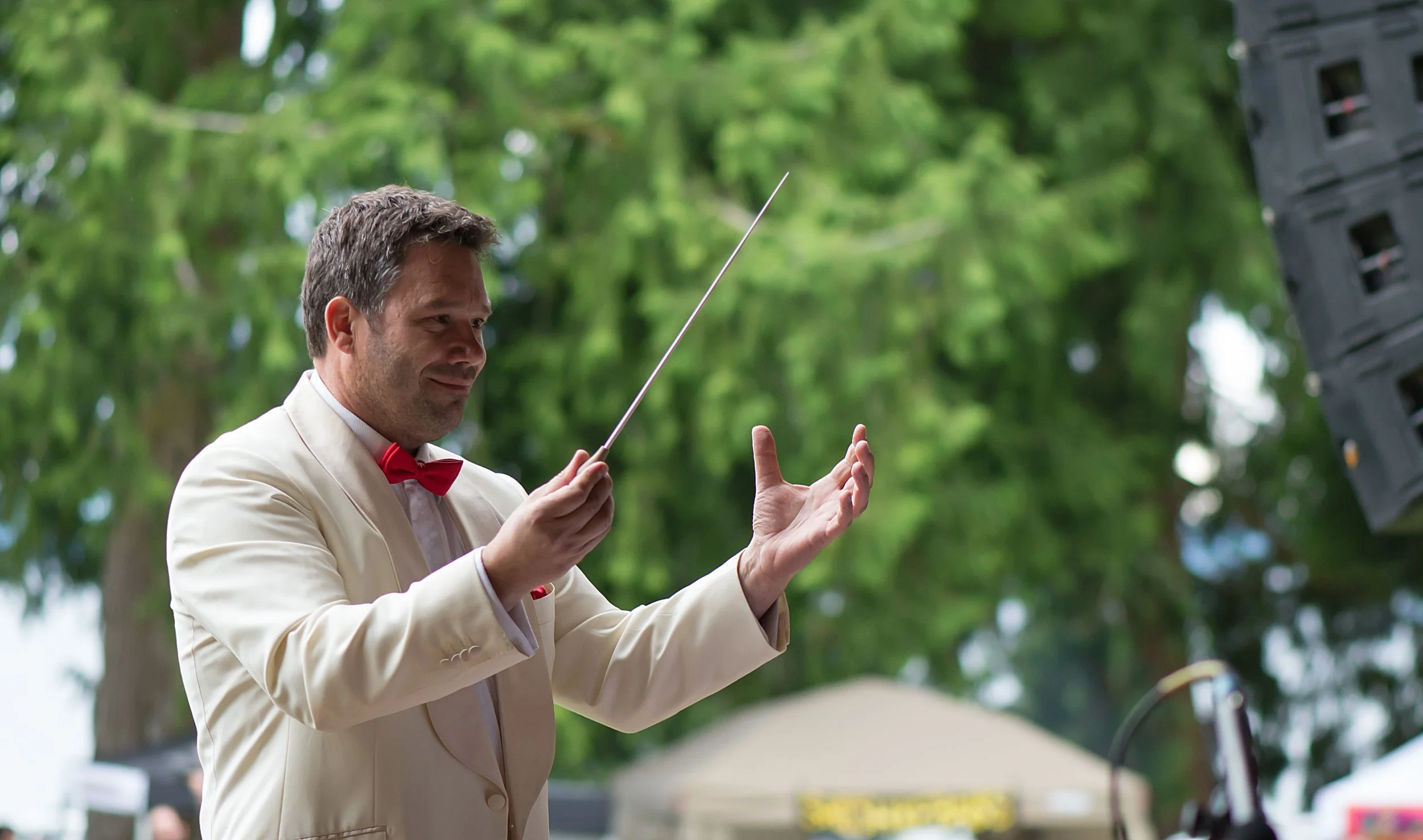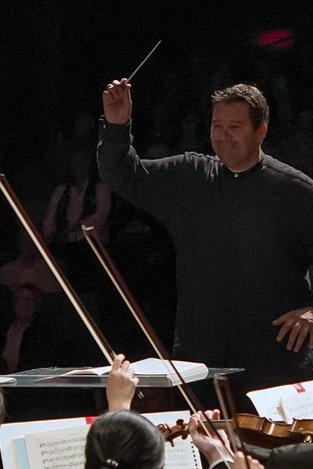Music as a positive force for peace drives international PRISMA Festival more than ever
Cofounder and artistic director Arthur Arnold, who recently stepped down from the Moscow Symphony Orchestra, has never felt stronger about musical connection
Arthur Arnold conducts an 80-member PRISMA Festival Orchestra en plein air.
The PRISMA Festival runs in Powell River from June 13 to 25
NEXT WEEK, approximately 80 of the world’s top music students from around the globe will gather in Powell River at the PRISMA Festival to form a symphony, performing key works like Rimsky-Korsakov’s Scheherezade and Bartók’s Concerto for Orchestra together.
It amazes conductor Arthur Arnold every year how people from such vastly different cultures and languages can communicate so easily together through a score of music.
“At 9 o’clock next Monday, that orchestra will be on stage and I will say, ‘Good morning everyone and welcome,’ and I’ll raise my arms and then bring them down and the orchestra will sound,” marvels Arnold, the Dutch-born cofounder and artistic director of PRISMA (Pacific Region International Summer Music Association), speaking to Stir over Zoom. “They will all play the same music; they know what to do, they all speak the same language. And you'd be surprised how, by five minutes already, they'll be amazing to listen to. And that molds together over that first few days into an orchestra.
“That is an example of what we can do as human beings,” he adds, “rather than fighting and killing each other.”
For 10 years now, the festival has been connecting people through the language of music—through master classes with renowned guest artists, open-air beach performances, grand orchestral concerts, and intimate chamber events over two weeks. That mission of connection and sense of purpose resonates even more so for this 10th anniversary edition—not just because the world is coming out of a pandemic, but because of the war in Ukraine.
It’s a war that has had major implications for Arnold’s own career: in March, the maestro stepped down as conductor of the Moscow Symphony Orchestra after Russia’s invasion of Ukraine. He had devoted more than 20 years of his life to leading the organization.
“The bottom line was you could not speak out against the war in that position or you're put in jail. You're not allowed to use the word ‘war’,” the accomplished and affable maestro laments, downplaying the toll of packing up and leaving the city and the orchestra he had helped develop for two decades. “I keep it pretty simple: for me, it's peanuts compared to what the people in Ukraine are going through. There’s no comparison.”
Today, Arnold, who is also a cellist, finds himself in the much more peaceful and inviting place of remote Powell River—the ideal setting for PRISMA’s academy and its public programming.
“Every time when I come to Powell River, whether I drive up or fly up, I’ve come from the big city,” says Arnold. “And all this tension falls off of your body, there is this beauty and fresh air and beautiful nature and you see the eagles fly.”
Maestro Arthur Arnold oversees an orchestra of 80 young members from around the globe.
The isolation of the setting is ideal, allowing the young musicians from as far away as Southeast Asia and Europe to give their art form their full concentration, he explains.
“The other great thing is the people here really support the festival, as individuals as well as all three levels of government,” he adds.
At the heart of PRISMA Festival is Arnold’s unique approach to providing intensive music education in a secure, welcoming space.
“I find education incredibly important, but I also find it important that it happens in a safe environment, because in our classical music world there's a lot of competition,” explains Arnold, who says he has drawn on his own struggles as a student. “We get 200 trying for one job—but if we are always scared to death, we get so cramped up and we can't breathe properly. Music is way more important than the battle around it. We have such important messages to connect people and to create a better world. So I’m very aware of the importance of gathering people as an orchestra, as an audience, and have that symbiosis between them, the musicians, and the composer.
“At the same time we have to be the best, it’s Olympic sport at its highest level, but we are also colleagues and we have to do this together,” he adds. “We have a lot of fun together, but at the same time we learn together. And the only competition is yourself. You will be better tomorrow than you will be today.”
The PRISMA Festival Orchestra shows the fruits of that approach next Friday night, June 17, with a performance of Scheherezade at the Sounds of Day and Night Concert at the Evergreen Theatre; movements from the same piece show up alongside parts of John Williams’ Theme from Schindler’s List, Mozart’s Piano Concerto No. 20 k. 466 D Minor, and more at the next evening’s family-friendly Concert on the Beach. Bartók’s Concerto for Orchestra shows up on the orchestra program during Bohemian Reflections, June 24 and 25 at the Evergreen.
Audiences also get intimate inside looks at the training and growth that’s going on at the fest: Limelight Concerts each afternoon feature both students and guest artists playing curated music, alongside master-class sessions devoted to individual instruments; admission is only $5 or free with a pass. Arnold says those sessions in the Evergreen are a bit like the seeing into the “kitchen” behind the festival. In addition, there is a Kids’ Concert & Fun Fair on June 21.
One of the programs that the conductor is most excited about is Forbidden Music Regained, chamber pieces performed June 23 by the fest’s guest artists and select students. All the works are by composers who were oppressed or in hiding during wartime in 20th-century Europe. Among the the most moving selections will be Leo Smit’s 1943 string quartet, which the Dutch composer, who was murdered during the Holocaust at Sobibor death camp, never finished. Arnold says the ensemble will stop on the high violin note where Smit left off, breaking for a moment of silence before oppressed Dutch Jewish composer Henriëtte Bosmans’s “Nuit Calme” soothes audience members back to a sense of peace.
“That's going to be deep and confronting in this day and age, with the war in Ukraine going on, but it will also be a deepening experience,” says Arnold, stressing that the program’s music itself is not all dark.
It’s telling that Arnold’s passion for peace in these troubled times has extended even to his work with PRISMA’s tiniest fans. Outside of the kids’ day, Arnold also makes a point of going out to local Powell River schools with his cello. And with the children there, he finds profound connection around music amid a world at war.
“We talked about the war and I played for them the Ukrainian national anthem,” he relates, becoming slightly emotional just thinking about the experience. “One group started to share their own losses, their pets or their father or mother… And then they sat hand-in-hand, listening to the Ukrainian national anthem and thinking so hard about those children there. And then we made a pinky swear: we made the decision that we will do things in our lives that will lead to peace and not to war. Because we can do that every moment of our lives: we can go left or right.
"That's what music is the vehicle for.”















